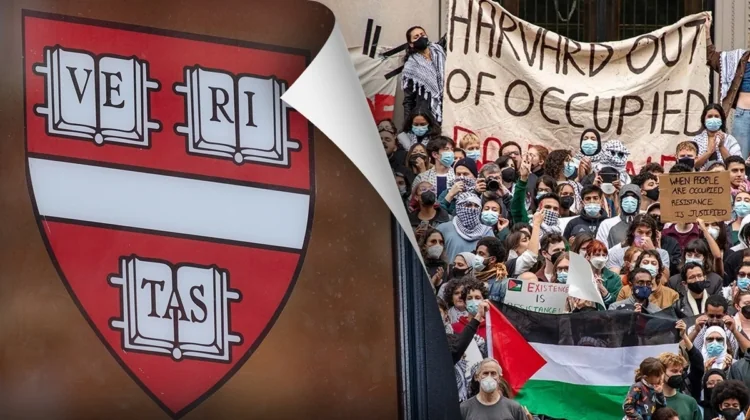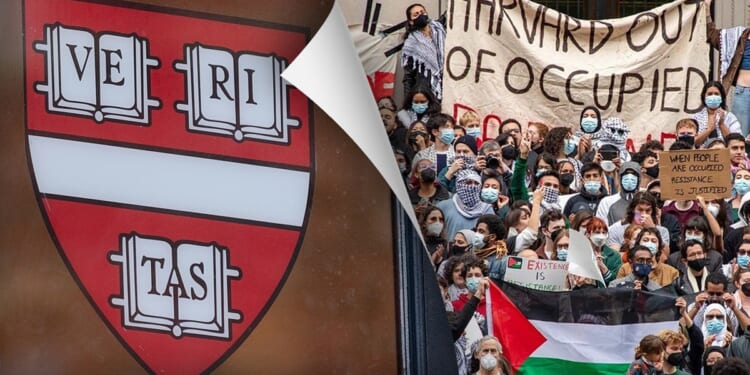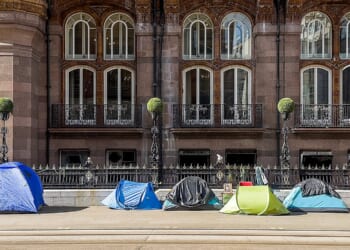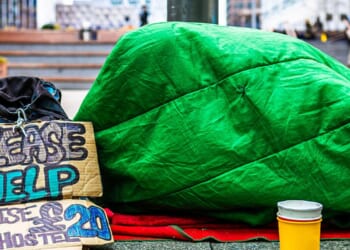
Order Michael Finch’s new book, A Time to Stand: HERE. Prof. Jason Hill calls it “an aesthetic and political tour de force.”
Sign up to attend Michael’s talk in Los Angeles on Thursday, November 20: HERE.
Editor’s note: A culture of rampant lawlessness has been steadily growing in American academia. Our nation’s universities have shamelessly put their pursuit of woke leftist ideology ahead of their loyalty and obedience to the laws of the United States of America and the principles of freedom and equality of opportunity that inform them. The Freedom Center is exposing the worst perpetrators of this illegal conduct as the Top Ten Academic Felons, and we will be highlighting one school a day as we count down from #10 to #1. Harvard University is #2 on our list.
#2: Harvard University
Harvard is arguably America’s most prestigious university. It is unsurprising then that when President Donald Trump began his campaign to combat the relentless anti-Semitism pulsing through our nation’s universities and force them to comply with federal law, that Harvard was one of his first targets.
In a letter to Harvard President Alan Garber, the Trump administration charged that the university has “failed to live up to both the intellectual and civil rights conditions that justify federal investment.”
The over 300-year-old academic institution is clearly guilty of violating federal law in a myriad of ways, not only through its dismal failure to suppress anti-Semitic activism that violates Title VI of the Civil Rights Act, but by knowingly discriminating against white, Jewish, and Asian applicants who apply to matriculate at Harvard.
Like many colleges and universities across the nation, Harvard played host to outrageous displays of Jew hatred over the past two years since Hamas’s October 7th massacre of over 1200 innocent Israeli Jews.
A report on anti-Semitism commissioned by Harvard itself found that Jewish students faced hatred, ostracism, and discrimination from both students and faculty on campus due to their faith and beliefs.
The Harvard Crimson reports:
Jewish and Israeli students told task force members that they experienced social shunning and hostility from peers who blamed them for the Israeli government’s actions. Some said peers would refuse to talk with them because they came from “a genocidal country” attend social gatherings where Israeli students were present. Several reported dropping classes they felt were one-sidedly anti-Israel.
One anecdote featured in the report and recounted in the Crimson concerns “an anonymous Jewish student intended to speak at a conference about being a grandchild of Holocaust survivors who helped tens of thousands migrate to Israel. But the conference directors rebuffed the speech, laughing in the student’s face and saying the speech was not ‘tasteful’ even though it had no mention of Zionism or the current war in Gaza, according to the account in the report.”
A pair of federal lawsuits filed against Harvard by a group of Jewish students and by the Louis D. Brandeis Center for Human Rights Under Law and Jewish Americans for Fairness in Education also alleged that Harvard’s failure to combat anti-Semitic behavior and discrimination on campus created a hostile environment for Jewish students. The university ultimately settled both lawsuits.
In July 2025, the HHS Office for Civil Rights (OCR) found Harvard in violation of Title VI of the Civil Rights Act of 1964 “by acting with deliberate indifference towards harassment of Jewish and Israeli students by other students and faculty from October 7, 2023, through the present.”
“OCR’s findings document that a hostile environment existed, and continues to exist, at Harvard,” states a release from that office. “This hostile environment includes harassing speech, threats, and intimidation targeting Jewish and Israeli students, including calls for genocide and murder. OCR’s findings also extensively detail acts of physical intimidation and violence between students. This hostile environment denied, and continues to deny, students’ fundamental educational opportunities. Such educational opportunities denied include safe class attendance, access to campus facilities such as libraries, dining halls, dorms, and other common areas, participation in extracurricular activities, and overall physical and emotional well-being on campus.”
Harvard’s illegal failure to combat the Jew hatred permeating the university is matched by its blatant discrimination in university admissions.
Harvard’s admissions procedures have been proven to be racist by the Supreme Court’s determination in 2023’s Students for Fair Admissions, Inc. v. President and Fellows of Harvard College that affirmative action based on race violates the Equal Protection Clause of the United States Constitution along with Title VI of the Civil Rights Act. But Harvard’s discriminatory admissions procedures towards whites, Jews, and most particularly Asian applicants, went far beyond even typical collegiate affirmative action programs in breaking the law.
In 2014, Harvard was sued in federal district court by a coalition titled Students for Fair Admissions (SFFA) for allegedly violating Title VI of the Civil Rights Act of 1964 which prohibits all schools which receive federal funds from discriminating on the basis of race. Through an examination of Harvard’s previously secret admissions data, SFFA was able to show that Asian-American applicants to Harvard face rampant racial discrimination.
Peter Arcidiacono, an economist at Duke University who testified in court on behalf of SFFA, concluded that Asian-American applicants have the lowest chance of admission to Harvard despite scoring highest in all objective measurements of achievement.
“Race plays a significant role in admissions decisions,” Arcidiacono wrote in his expert report. “Consider the example of an Asian-American applicant who is male, is not disadvantaged, and has other characteristics that result in a 25% chance of admission. Simply changing the race of this applicant to white—and leaving all his other characteristics the same—would increase his chance of admission to 36%. Changing his race to Hispanic (and leaving all other characteristics the same) would increase his chance of admission to 77%. Changing his race to African-American (again, leaving all other characteristics the same) would increase his chance of admission to 95%.”
“Despite being more academically qualified than the other three major racial/ethnic groups (whites, African Americans, and Hispanics), Asian-American applicants have the lowest admissions rates,” Arcidiacono continues. “In fact, data produced by Harvard show that this has been true for every admissions cycle for the classes of 2000 to 2019.”
Professor Arcidiacono was able to trace this discrepancy in admissions rates to the highly subjective “personal rating” which admissions officers at Harvard assign to applicants. “Asian-American applicants, however, do not score as well on the Personal Rating and the Overall Rating relative to other racial/ethnic groups—especially when compared to other groups within the same academic index deciles,” he writes. “But there is no observable reason why this should be so; the testimony from officers and leaders of the Admissions Office is that there is nothing about Asian Americans as a group that would suggest they have less attractive personal qualities. Ratings given by alumni interviewers do not show this pattern.”
“It turns out that the suspicions of Asian-American alumni, students and applicants were right all along,” Students for Fair Admissions concluded in a court document. “Harvard today engages in the same kind of discrimination and stereotyping that it used to justify quotas on Jewish applicants in the 1920s and 1930s.”
“What Harvard will not admit (but the record shows) is that race is not only an important factor, it is the dominant consideration in admitting Hispanics and African Americans,” William Consovoy, who represents Students for Fair Admissions, stated in a court filing.
After appealing the case all the way to the Supreme Court, SFFA scored a victory—resulting in the Court’s determination that any racially-based preferences in admissions decisions are unconstitutional and a violation of Title VI.
Writing for the majority, Chief Justice John Roberts explained how Harvard’s policies and similar ones employed by other universities violate “the Equal Protection Clause’s twin commands that race may never be used as a ‘negative’ and that it may not operate as a stereotype.”
“The First Circuit found that Harvard’s consideration of race has resulted in fewer admissions of Asian-American students,” Roberts continued. “Respondents’ assertion that race is never a negative factor in their admissions programs cannot withstand scrutiny. College admissions are zerosum, and a benefit provided to some applicants but not to others necessarily advantages the former at the expense of the latter.”
Following the Supreme Court’s ruling, Harvard changed its admissions procedures to include five short-answer questions, one of which states: “Harvard has long recognized the importance of enrolling a diverse student body. How will the life experiences that shape who you are today enable you to contribute to Harvard?”
The Harvard Independent notes:
Regardless of this shift in admission questions, the College’s racial demographics still changed after the ruling. For the Class of 2028, the percentage of newly enrolled African American students fell from 15.3% to 14%, while Hispanic or Latino enrollment fell from 16% to 11.3%. In contrast, the proportion of Asian American students rose up to 37% from 29.9%. While still of note, these changes were minor in comparison to similar institutions—MIT, for instance, saw the percentage of Black students enrolled drop from 15% to 5%.
Given this curiously small drop in black and Hispanic admissions compared to rival MIT, it seems questionable whether Harvard is continuing to violate the law by using racial preferences to bias admissions decisions. For its blatant Jew hatred and its failure to comply with constitutional and civil rights law in admissions decisions, Harvard deserves its high ranking on the list of Academic Felons.
Previous articles in series:
#10: Academic Felon: Golden West College.
#9: Academic Felon: University of Arizona
#8: Academic Felon: San Jose State University
#7: Cornell University
#6: University of Louisville
#5: Massachusetts Institute of Technology
#4: University of Pennsylvania
#3: University of California-Los Angeles
















